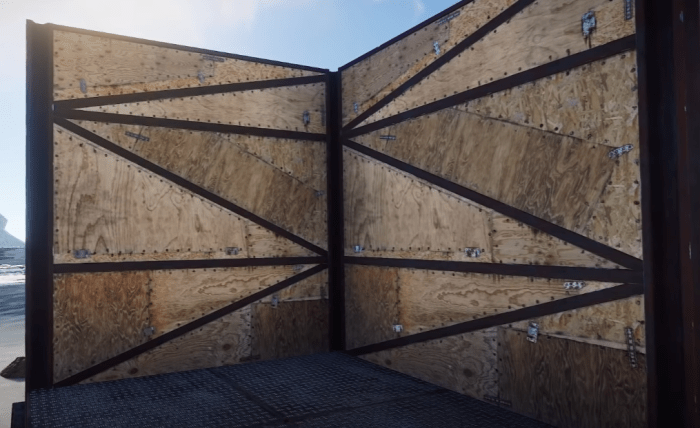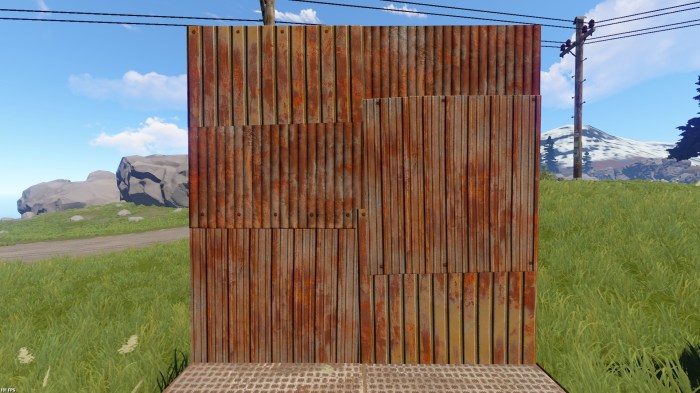When it comes to rust sheet metal walls, understanding the causes, prevention, removal, and repair techniques is crucial for maintaining their longevity and aesthetics. This comprehensive guide delves into the intricacies of rust formation on sheet metal walls, exploring various methods to prevent, remove, and repair rust damage effectively.
Delving into the factors that contribute to rust development and the environments where it’s prevalent, this guide provides a thorough understanding of the underlying mechanisms. By discussing the effectiveness, pros, and cons of different rust prevention methods, homeowners and businesses can make informed decisions to safeguard their sheet metal walls from corrosion.
Rust Formation on Sheet Metal Walls: Rust Sheet Metal Wall
Rust is a common problem for sheet metal walls, especially in areas with high humidity or exposure to moisture. The process of rust formation begins when iron in the sheet metal reacts with oxygen and water to form iron oxide, commonly known as rust.
Factors that contribute to rust development include exposure to moisture, salt, and acidic environments.
Common Environments Where Rust on Sheet Metal Walls is Prevalent
- Coastal areas with high salt content in the air
- Industrial areas with acidic pollutants
- Areas with frequent rainfall or high humidity
Methods to Prevent Rust on Sheet Metal Walls

There are several methods to prevent rust on sheet metal walls, each with its own effectiveness and drawbacks:
Protective Coatings
- Galvanization:Applying a zinc coating to the sheet metal creates a protective barrier against corrosion.
- Paint:A properly applied paint coating can seal the metal from moisture and oxygen.
- Powder Coating:A durable, corrosion-resistant coating applied electrostatically.
Treatments
- Rust-Resistant Primers:Primers containing rust-inhibiting chemicals can prevent rust formation.
- Rust Converters:Chemical solutions that convert existing rust into a stable, non-corrosive compound.
Rust Removal Techniques for Sheet Metal Walls

Rust removal techniques vary in their effectiveness and safety:
Mechanical Removal
- Sandblasting:A high-pressure stream of abrasive material removes rust but can damage the metal surface.
- Wire Brushing:Manual or power-driven wire brushes can remove loose rust but may leave scratches.
- Grinding:Using a grinder with an abrasive disc can remove heavy rust but requires skill and safety precautions.
Chemical Removal
- Rust Removers:Acidic or alkaline solutions that dissolve rust but require careful handling and disposal.
- Electrolysis:An electrochemical process that uses a sacrificial anode to remove rust.
Repairing Rust Damage on Sheet Metal Walls
Rust damage on sheet metal walls can be repaired using various techniques:
Small Rust Spots, Rust sheet metal wall
- Sanding and Painting:Remove loose rust, sand the area, and apply a rust-resistant primer and paint.
- Rust Repair Kits:Commercially available kits contain tools and materials for small rust repairs.
Large Rust Areas
- Patching:Cut out the rusted area and weld or rivet a new piece of sheet metal in its place.
- Replacement:In severe cases, the entire rusted section of the wall may need to be replaced.
Rust Prevention and Maintenance for Sheet Metal Walls

Regular maintenance is crucial to prevent rust on sheet metal walls:
Maintenance Schedule
- Inspect regularly:Check for signs of rust, especially after exposure to moisture or salt.
- Clean and Dry:Remove dirt, debris, and moisture from the walls to prevent rust formation.
- Touch-Up:Repair any scratches or damaged coatings promptly to prevent further corrosion.
Benefits of Maintenance
- Extends the lifespan of the sheet metal walls
- Maintains the aesthetic appearance
- Prevents costly repairs and replacements
FAQs
What are the common factors that contribute to rust formation on sheet metal walls?
Exposure to moisture, oxygen, and contaminants such as salt and chemicals are the primary factors that accelerate rust formation.
What are the effective methods to prevent rust on sheet metal walls?
Applying protective coatings like paint, galvanizing, or powder coating, and maintaining a clean and dry environment are effective rust prevention measures.
What are the different techniques used to remove rust from sheet metal walls?
Mechanical methods like sanding or wire brushing, chemical treatments using rust removers, and electrochemical methods like electrolysis are commonly used rust removal techniques.
